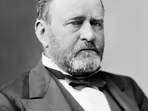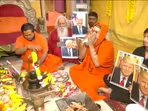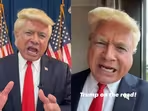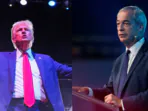The significance of Chinese president Xi Jinping’s meeting with former Taiwanese president, Ma Jing-yeou
President Xi Jinping recently met former Taiwanese president and opposition leader Ma Jing-yeou in Beijing, the first time a Chinese leader hosted a former president from the self-ruled island.
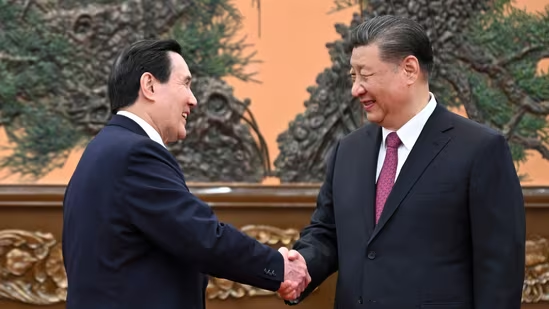 PREMIUM
PREMIUM
Until now, no serving or former leader from Taiwan had visited China since the retreating Kuomintang (KMT), after being defeated by Mao Zedong’s Communist Party of China (CPC), took refuge and built a nation on the island of the southern Chinese coast in 1949. (Xi and Ma had met at a landmark summit in Singapore in 2015.)
Besides being rare, the high-profile meeting on April 10 was full of calculated courtesies.
Xi, for one, addressed Ma by his name, and the latter by the Chinese president’s designation as the CPC general secretary, each avoiding the usual formal diplomatic parlance of “your excellency” etc.
The way the two addressed each other was more than symbolic, it was necessary: Neither can recognise the other as president.
Political expediency
China sees democratic Taiwan as its own territory, a renegade region, to be merged with the mainland with force if necessary; Taipei rejects that assertion, asserting instead that it is self-ruled, and that it’s the will of the Taiwanese that will decide the future of the country.
Ma was Taiwan’s president between 2008 and 2016, a period that saw warmer ties between Beijing and Taipei. He remains an influential opposition leader of the KMT, which also opposes reunification but advocates closer cross-strait ties.
Given the binary, Ma’s 11-day tour of China — his second in about a year — leading a student delegation and his meeting with Xi at the Great Hall of the People was closely tracked.
Xi took the opportunity to push for “reunification” even if he packaged his firm positioning with soft talks about a “family reunion”.
“Compatriots on both sides of the Taiwan Strait are all Chinese people. There is no grudge that cannot be resolved, no issue that cannot be discussed and no force that can separate us,” Xi told Ma, according to the agency reports, adding: “External interference cannot stop the historic trend of the reunion of the family and the country.”
Both sides of Taiwan belong to “one China”, he said.
“There is no rancour that cannot be resolved, no problem that cannot be discussed, and no force that can separate us.”
Ma reciprocated along the lines of how a war would be unbearable for the “Chinese people”, referring to the ethnicity of the people on either side of the Taiwan Strait.
“If there’s war, it would be unbearable to the Chinese nation, and the two sides of the [Taiwan] strait have the wisdom to handle their disputes peacefully,” Ma said, according to Reuters.
“I sincerely hope that both sides can respect the values and ways of life of their peoples,” Ma said, adding that “recent tensions between the two sides … have triggered a sense of insecurity among the public in Taiwan”.
The timing of the Xi-Ma meeting coincided with two developments and came ahead of a third one.
History of relations
One was the anniversary of the US-Taiwan Relations Act. It was signed in April 1979 and defines ties between the island and the US but keeps bilateral relations unofficial.
Despite the official line of Washington following the “one China” policy Beijing remains particularly indignant with Washington’s deep engagement with the island country especially in the context of arms sales: China calls it “external interference” in internal matters.
It’s a “red line” was how Xi described China’s position on US-Taiwan ties in a recent phone conversation with US President Joe Biden.
The meeting also coincided with the US-Japan summit in Washington and took place a day before the first-ever trilateral meet between the two countries and the Philippines: Both Japan and the Philippines have territorial disputes with China and, at the end of the trilateral, Biden said the US defence commitments to the two countries remain “ironclad”.
And, Xi and Ma’s meeting took place just a month before Lai Ching-te, Taiwan’s new president from the Democratic Progressive Party (DPP), took oath with incumbent Tsai Ing-wen making way after completing two terms. Beijing sees Lai as a troublemaker and “instigator of war”, given his statements on ties between Taiwan and the mainland.
“The meeting seems to have primarily benefited Xi, projecting domestically that Taiwan isn’t a lost cause. Yet, back in Taiwan, Ma faces difficulty in selling this notion, given the evolving sentiments towards China,” said Sana Hashmi, a postdoctoral fellow at the Taiwan-Asia Exchange Foundation and a fellow at George H. W. Bush Foundation for US-China Relations.
Referring to the timing of the meeting, Hashmi said it could be interpreted as a message to the US and, of course, to the DPP in Taiwan.
“This timing suggests Xi’s intention to signal to Taiwan and the US that he is willing to engage with stakeholders who may be amenable to his overtures, even if they are not necessarily influential in Taiwanese politics or the broader US-China-Taiwan triangle.”
Continue reading with HT Premium Subscription
Daily E Paper I Premium Articles I Brunch E Magazine I Daily Infographics Subscribe Now @1199/year Already Subscribed? Sign In Share this article
Share this article - Beijing
- Taiwan
- Opposition Leader
Disclaimer: The copyright of this article belongs to the original author. Reposting this article is solely for the purpose of information dissemination and does not constitute any investment advice. If there is any infringement, please contact us immediately. We will make corrections or deletions as necessary. Thank you.
Title:The significance of Chinese president Xi Jinping’s meeting with former Taiwanese president, Ma Jing-yeou
Url:https://www.investsfocus.com

